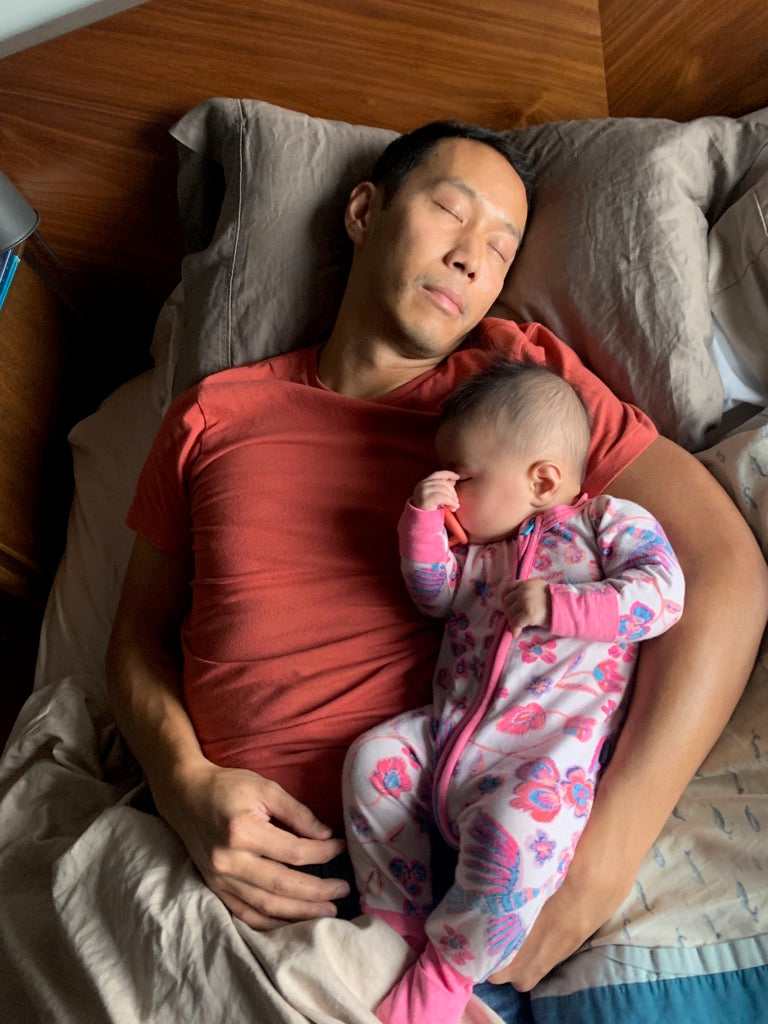Sleep Wellness with Sasha Kern

SLEEP - we all need it and it's probably the issue we hear new (and not so new) parents struggling with the most.
Last week our beloved regular host of The Nook, Sasha Kern of BlissfulBabySleep, was our featured guest on the subject of Sleep Wellness. She answered a few of parents' most common and pressing questions about sleep.
Issues with sleep are a relatively new phenomenon and within families it's common to hear grandparents say something along the lines of, "I don't know why your baby doesn't sleep? My babies all slept!" Here's the difference, they put their babies on their stomachs, wrapped up in blankets rather than on their backs and it was a more natural position for the babies to get comfortable on their own. They don't want to be on their backs, with nothing on them and without us. It's not a natural thing for them so we have to give them space to learn how to do it.
The other issue is, there is SO much information and so many ideas, often contradictory, and it's overwhelming!
"My job is to help you weed through all that information and help parents come up with a plan to help them get sleep."
Things you've heard about sleep:
"You're never going to sleep again!"
"Negative connotations around sleep training vs helping your baby learn to sleep on their own"
"You need to let your baby cry. Comforting your child is not allowing your child to self-regulate"
These have become two polarized camps "You have to do "this" or you'll mess up your baby," which is fairly new in the last 10 years or so. But it has become a business, people compete for followers, and that has changed what we hear about sleep. Either don't let them cry at all or let them cry non-stop.
Sasha believes there is a middle ground. Teaching your child to sleep, but also being there for them. But know that children are not being "broken" by either method or something in between.
Every baby is different. We can't compare apples to apples because each baby has their own way. And each baby will change over time.
Wake windows and tired signs people get a bit mixed up. Some babies don't show tired signs, but wake windows are pretty standard for different ages. That being said, these numbers have been compiled from large groups of people and you might find something a little different works for your baby.
Sasha is a firm believer in the newborn month, which really applies to the first 3 or 4 months. See what works for you. Babies are not born knowing how to sleep. Your baby may fall asleep independently, but don't count on it and rocking and having them on you is fine. If your baby, in the first couple of months, will only sleep on you that is totally fine. That's normal and what they need. There's no connection between what they do when they're first born and wanting to do sleep training later on. Do what works in these first few weeks. There are no bad habits at this point. Babies are so adaptable that they will learn to do something different later.
Sleep training has got a bad connotation because of methods like 'extinction or cry it out' and sleep training are used interchangeably, but there's a wide range of ways that you can help your baby learn how to fall asleep.
Sleep training is giving your baby space to learn their own sleep methods. If they are given something to fall asleep; nursing, rocking a soother etc. most likely they will think they need that prop to get back to sleep in the middle of the night. We all wake up in the night, but what we know is that babies need to learn they can just go back to sleep.
If your baby falls asleep nursing and you can transfer them and it's not disruptive then it might be ok for you, but if they wake up after half an hour and need it again then that's when it becomes a sleep prop and they need that space to realize that they can fall asleep without it.
If they can go 3 or 4 hours during the day between feeds they can do that at night too. If they wake before that give them some time to fall back asleep without feeding and that might involve a little rocking or cuddling at first. Sasha suggests starting with bedtime. If they have their sleep prop at bedtime they won't know they can fall asleep without it when they wake during the night. Once they know they can get to sleep without it when they go down for the night, getting back to sleep without it will be easier.
Parents can think of a period of crying during the night as the baby expressing frustration over how to get back to sleep on their own. They know they're still tired, they just have to figure out how to get back to sleep. When they're figuring out crawling and know they want to get somewhere, but can't they get frustrated, they might cry, but we let them figure it out. We encourage them, we comfort them, but we don't do it for them. We can have the same approach toward sleep.
Another common issue parents face is early morning waking.
Here's an example: "...At 14 months, he'll go down for the night at 7:30pm, sleep well, then wake up at 4:30am for the day. Then we struggle with a nap time routine during the day.."
In Sasha's many years of experience as a sleep consultant, early wake ups have a multitude of causes. VERY rarely is it that they don't need more than that amount of sleep. 10.5-11 hours through the night is fairly common, 11-12 hours is ideal for growth and development.
Look at how he's waking up. Waking up happy, not angry is a good sign. Draw a line in the sand, e.g., 6:00am. No getting out of the crib before 6am. The line in the sand is for the parent so you don't gradually give in earlier and earlier. If the wake time is 4:30 you might want to draw the line a little earlier than that and move it gradually. It might be 15 minutes per week for a few weeks to make the change. Keep notes so you notice small improvements of even 10 minutes. How much is he actually sleeping? Does he only need 10.5 hours or is he just hoping you'll play with him. You will know if he's getting enough sleep if he still wakes up at 4:30 even if it's boring.
Once you know for sure that they are getting enough sleep, then consider a later bedtime.
"How do I know when to go down to one nap?"
The best sign for going down to one nap is usually that they'll go down well for their first (or second nap) and are just not sleeping at the second one. It doesn't have to be even through the day. Move the morning nap later by half hour increments a few days at a time. Try 11:00am, then 11:30. If they're really exhausted by 11:30 stay there for a while. Do not expect the two naps to become one and it to be twice as long. Needing an earlier bedtime won't necessarily translate to an earlier wake time. If you're quite sure they're ready to go to one nap, it's easiest to commit to the one nap and then you'll have a really clear picture of what's happening with night and day sleep.
"Never wake a sleeping baby?"
Sasha advises not to interrupt/cap a nap unless it will really interfere with the next nap or bedtime. They'll do what they need. If once in a while they have a 3 hour sleep it won't cause a big problem unless it's going to interfere with bedtime. There are so many transitions with growth spurts and learning new things that they will sometimes vary during the day from one day to the next. For most babies, 7 pm is an ideal bedtime, so back-time from that with their wake window between the last nap and bedtime. E.g., wake by 5:15ish if they have a wake time of 1.5-1.75 hours so they can fall asleep at 7pm.
When do you give up nap all together? Are they going to bed fine at night? Is it at a bedtime that works for you? Are they happy and wide awake playing at bedtime? Try moving bedtime up gradually and see if they don't need the nap as much.
Sasha's number one advice to everyone, sleep training or not, is to give their baby a few minutes when they wake up to settle themselves. When they're newborn, even 3 minutes. You will be surprised at how much difference it can make in letting them learn to get back to sleep.
For advice about your family's questions surrounding sleep contact Sasha at www.blissfulbabysleep.com and follow her on instagram @blissful.baby.sleep
Contributed by Shauna Farrell
Join us this Wednesday Dec. 7th at "The Nook" when we host Carolyn Anne Budgell, Yoga & Breathwork Practitioner, to guide us and speak on soothing ourselves as parents. Doors open at 11:45!
